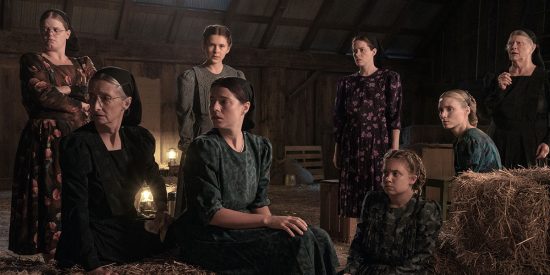TIFF 2022 Review: Women Talking – “Sarah Polley’s masterpiece”

Courtesy of TIFF
Note: The following review has mentions of sexual abuse and violence
“What follows is an act of female imagination,” states a title card at the beginning of writer-director Sarah Polley‘s newest project, Women Talking. The film is based on the novel of the same name by Miriam Toews, which was inspired by a series of violent attacks within a Mennonite community in Bolivia, where men in the colony gave women animal tranquilizers and repeatedly raped and assaulted them. When the women awoke, bloody and bruised, they were told it was the work of Satan, or that they were making it up. These attacks too, were an act of ‘female imagination.’ Towes, an ex-Mennonite herself, thankfully never dealt with this level of violence in her community, but the religious and conservative upbringing she did experience influences and informs her writing (you can read All My Puny Sorrows, or watch the 2021 film adaptation, which is semi-autobiographical).
What follows is a discussion full of anger, full of hurt that often results in more questions than there are answers. For nothing is straightforward, they are dealing in shades of grey. If they stay and fight, do they become murderers, contradicting their belief in pacifism? If they leave, where do they go? They’ve never even seen a map, and have no idea where they are. What happens to their sons if they leave the men behind? If they cannot forgive the men, will they still get into heaven? And “Is forgiveness that’s forced upon us really forgiveness?”
The film is led by an outstanding cast that includes Rooney Mara, Jessie Buckley, Claire Foy (a standout here), Judith Ivey and Sheila McCarthy (whose character Greta does have a few great anecdotes about her horses Ruth and Cheryl to lighten an otherwise somber mood). Frances McDormand, who acts as producer on the project, is more of a cameo here, but no less effective in her small role. I should say there are others in this ensemble that are also remarkable but in the interest of space, I cannot praise them all. They are all truly inspiring.
The only man in the room while the colony’s women discuss their fate is August (Ben Whishaw) who takes the ‘minutes’ from their debate. He had been away at University and recently rejoined the colony in order to help. His presence as a force of good is important because this is not a film condemning all men, it’s condemning and challenging the patriarchy. In the book, August narrates, but the film’s narrator is instead Autje (Kate Hallett) speaking to an unborn child, a consequence of the rapes they have suffered. The shift is tonally important, allowing us to experience this from a young woman’s voice as opposed to a man’s.
Director Sarah Polley works with cinematographer Luc Montpellier (who also worked with Polley on 2006’s Away From Her) in an unsaturated palate, draining much of the colour from the screen (even further for flashbacks). It works for a variety of reasons, highlighting the muted world these women have been in. But along with the costuming, the aesthetic makes the film look like it is occurring in a historical context; that is until we get information that tells us it is happening much closer to the present than you’d ever imagine. Imagery here is important and Montpellier finds beauty and hope in the shots taken outside the claustrophobic barn. He somehow finds optimism in twilight shots as the sun goes down and the women decide their fate.
This inventive and creative director already has the wonderful films Take This Waltz and 2012’s award-winning documentary Stories We Tell behind her, but Women Talking is Sarah Polley’s masterpiece. Clearly a work of passion, complex and layered, this film is sure to resonate, especially with women, for we are all still walking around in a man’s world. Adapted by Polley, who seems assured a Best Adapted Screenplay nomination for her work (amongst perhaps others for this film), Women Talking asks important questions about how, in the current political landscape especially, we as a group can take responsibility for ourselves and how we can use our voices collectively for change. Sarah Polley ensures that when women are talking, we are all listening.










